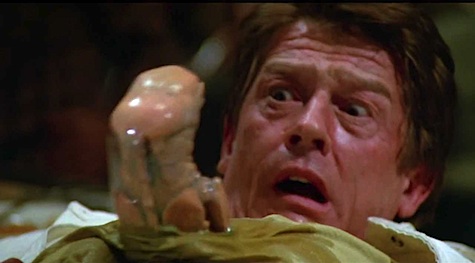If you’re still upset about 2012’s Prometheus not quite-being-the-Alien-prequel you’d hoped for, this news might not help much. Direct from director Ridley Scott, the sequel to Prometheus will not contain the xenomorph aliens from the film Alien, which started this whole thing to begin with.
But maybe that’s okay?
Mild spoilers for Alien, and Prometheus
Claiming he wants to do “something” new and that there’s only so much “snarling” before things get played out, Ridley Scott seems fairly staunch in the idea that the popular xenomorphs (the chust-busters!) won’t show up in the sequel to Prometheus. And while this might seem a little irritating, you have to remind yourself that Ridley Scott excels at being sort of bonkers all the time.
In the final scenes of Prometheus, we see a proto-version of a xenomorph emerging; the unholy combination of the squid baby and one of the Engineers. And though it might seem weird to show us this creature and then not use it in the next movie, it’s really not. Whether you liked the movie Prometheus or not isn’t really the point, because in terms of “explaining” the origin of where the aliens from Alien came from, it does a pretty good job. (Even if it does contradict the AvP movies, but whatever.)
The story of the xenomporphs could, of course conceivably go on in new films, but the statement that Prometheus was making about them was simply this: they weren’t really ever a normal race of creatures, but instead, a kind of bespoke “weapon” stock-piled by the Engineers that eventually turned on them. Accordingly, the Engineers also created us, and we turned on them, too, meaning even though Ellen Ripley has to tango with the xenomorphs decades after the events of Prometheus, humans and “aliens” alike all turned on their makers. The difference is that the xenomorophs were always weapons to be “used” and their specific evolution was an accident. The story of those consequences has already kind of been told through the existing Alien films, meaning bringing back those creatures could sort of ruin how awesome they are and muddle things thematically. Like it or not, Ridley Scott did sort of close the loop on the origin, even if it was “unsatisfactory” or “inconsistent.”
Instead, the truly interesting stuff in Prometheus was connected to the way the human characters were freaked out by the robot David, and how he in turn kind of tried to screw them over. Because we created David and the Engineers created us, the analogy is more tidy, which creates a potentially better science fiction story. Everything in this fictional universe seems to be connected to the idea of artificiality and what that notion even means. Because the humans exist thanks to the Engineers and we make robots (and sometimes other stuff, on accident) then the definition of what is “artificial” life has already been futzed with. Elizabeth Shaw keeps going at the end Prometheus because she’s not satisfied with the answers to existence. She went out into space to find the meaning of everything, and to figure out if there was an outer-space God. Instead, she found space-God’s middlemen, the Engineers, a bunch of tall, muscle-y guys who were really, really mean, and even though they probably “made” us, there’s not a clear answer as to who made them.
One of the reasons we come back to serialized fiction—like comic books, films, or linked short stories—is to get questions answered. There are still a lot of unanswered questions about David and his race of robots. And there are the bigger questions for Shaw and who the “parents” of the Engineers might be. On the other tentacle, other than small logistical questions of movement from one planet to another, there aren’t really any new questions to be answered about the xenomorphs. Ridley Scott took a fairly inexplicable monster and gave it a quasi-feasible origin story. It might not be what the fans wanted, but it happened.
Bringing back the xenomorphs for Prometheus 2 would be awesome because the creatures themselves are scary-exciting. But if Ridley Scott is going to do something interesting with Shaw, David and their themes, he probably needs to avoid the most relentless monster of the all: fan service.
Ryan Britt is a longtime contributor to Tor.com.










